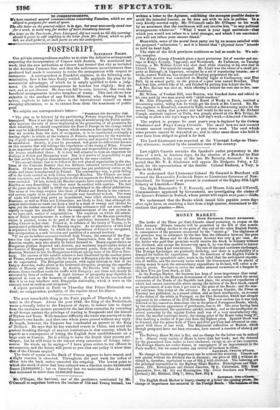POSTSCRIPT.
SATURDAY NIGHT.
Our private correspondence enables us to state the definitive arrangement respecting the incorporation of Cracow with Austria. We mentioned last week, that the new authorities at Cracow had treated that city as included in the Austrian Customs line, and that the unforeseen inconveniences thus produced had made it necessary to revise the arrangement with respect to commerce. A correspondent at Frankfort explains, in the following com- munication, how it has been finally settled. He applauds the plan for its commercial advantages, of which he is amply qualified to form a judg- snout. On its political consequences he touches but slightly: they are vast, and as yet obscure. He does not fail to note, however, that even the beneficial arrangements involve breaches of treaty. This fact shows how culpable is the conduct of any British Minister, who, drawing back in spleen, neglects to take his place in the international council on these sweeping alterations, so as to extract from them the maximum of public
Pod- We subjoin our correspondent's letter— "Frankfort, 6th December 1816.
"The plan to be followed by the partitioning Powers respecting Poland has transpired. Were it not that the arbitrary step of annihilating the Polish nation- ality deprives the acts of those implicated in the proceeding of all guarantee for their durability, we should congratulate the East of Europe on the change which mow may be looked forward to. Cracow, which remains a free trading city for the first six months from the date of occupation, is to be constituted eventually a trading dep6t; in which, at the instance of Prussia, magazines for the warehous- ing of goods manufactured in the Zollverein states, and imported in bond, are to be established. Austria, it must be presumed, will grant no differential favours cm this occasion that will infringe the stipulations of the treaty of Milan. Cracow is an important place of trade, from the practice and respectability of the mercan- tile houses established there. It is very well situated to form an emporium for dealings in Polish and Hungarian wool. Nor is it matter of impossibility to pay for that article in English manufactured goods by the same channel. "The second change that is to follow in the new plan of organization is the abo- lition of the Customs frontier that has hitherto subsisted between Poland and Russia. Of late years the Russian Government has put prohibitory duties on the cloths and linens manufactured in Poland. The consequence was, a great falling off in the trade carried on with China through Kiachta. The Chinese are luxu- rious consumers, and the Russian products did not supersede the Polish when these were excluded. Of late, indeed, the Russian reports have represented the trade at 'Giant as very flourishing; but they must be credited with caution. The fact of the great decline in 1837 to 1840 was acknowledged in the official publications. The union of two large empires like those of Poland and Russia in one commer- cial system, ought to be productive of results very beneficial to both. The want of roads will indeed long prove an impediment, were other obstacles removed. Buisians, as well as Poles and Lithuanians, are likely to find, that although ill- judged restrictions on trade can keep a land in a state of swamp and thicket for ages, yet the sudden removal of these desolating ordinances will not alone suffice rapidly to repair the mischief. Still, the commencement of the new system is, as we have said, matter of congratulation. The condition on which the admis- sion of Polish manufacturers to a share in the spoils -of the Russian protecting duties is granted, seems to be part of the equivalent demanded by Russia for selling Cracow to her rival. Poland is, in defiance of the treaty of Vienna, to be incorporated politically into the Russian empire. As no alternative of this kind is stipulated in the treaty, by which the independence of Cracow is recognized, this incorporation is a new invasion and partition of a neutral territory.
"If we are to believe accounts received from Vienna, the removal of the Cus- toms line that now separates Hungary and Transylvania from the rest of the Austrian empire, may also shortly be looked forward to. Heavy export-duties on Hungarian produce imported into Austria, and moderate import-duties levied at the frontier of Hungary on Austrian manufactured goods, form the plan of the Austrian Minister to tax the Hungarians without asking leave of the Diet at Pres- hurg. The success of this notable scheme is best illustrated by the market prices at Vienna, where grain exactly sells for its price in Hungary plus the duty imposed on its exportation. The Hungarian peasant, with equal stoicism to that of the hungry Austrian, walks about in his undressed sheepskin, despising the superfine cloths of Moravia and Bohemia. In Austria, the Danube with its tributary streams forms excellent roads for traffic with Hungary; and those will shortly be extended by lines of reilways. A rapid increase of prosperity may therefore be expected as soon as the measure is adopted. It will not be the less beneficial that it in no way interferes with Hungarian nationality, which it must on the contrary tend to confirm and invigorate." A report prevailed in Paris on Thursday that Prince Metternich was dead; an exaggeration, probably, of the reports about his illness.


























 Previous page
Previous page